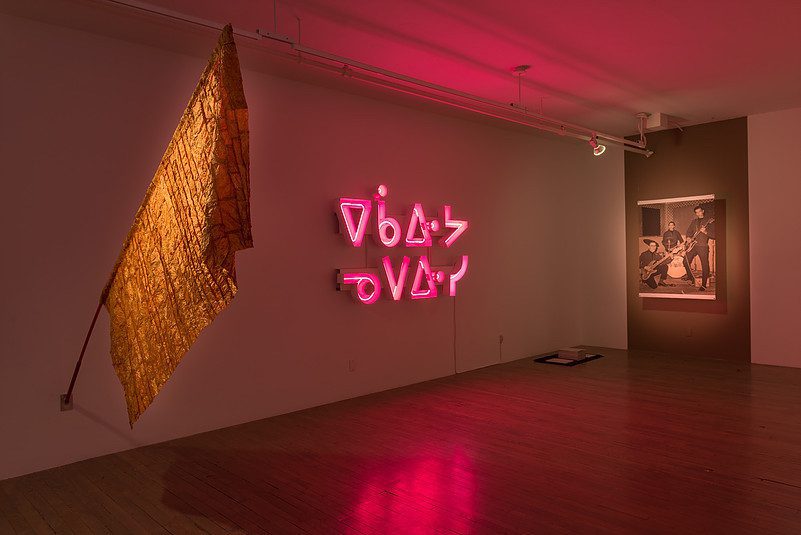SBC Gallery, Montreal, Canada
21 Sep 2017 - 16 Dec 2017

Installation view, Wood Land School: Kahatenhstánion tsi na’tetiatere ne Iotohrkó:wa tánon Iotohrha / Drawing Lines from January to December, Second Gesture, 2017. Courtesy of Wood Land School / SBC Gallery of Contemporary Art, Montreal. Photos: Paul Litherland
For the duration of 2017, SBC Gallery of Contemporary Art will be renamed and operate as Wood Land School. An itinerant project first instigated by Duane Linklater, this instance of Wood Land School is organized by Duane Linklater, Tanya Lukin Linklater and cheyanne turions, with Walter Scott. Wood Land School: Kahatenhstánion tsi na’tetiatere ne Iotohrkó:wa tánon Iotohrha / Drawing Lines from January to December is conceived as a single year-long exhibition that will unfold through a series of gestures—clusters of activity that bring works into and out of the gallery space—such that the exhibition is in a constant state of becoming. Kahatenhstánion tsi na’tetiatere ne Iotohrkó:wa tánon Iotohrha / Drawing Lines from January to December recognizes the power of line to mark history and invoke memory, proposing lines without beginning or end as a way to imagine Indigenous futurity. This project is the continuation of a conversation and it is the forging of new relationships. From an initial position of Indigenous self-determination and collectivity, we situate ourselves as impacted upon by forces both nurturing and destructive; we work to be aware of our own participation in dispossession; and we consider our capacity to articulate new ways of being in relation. Contemporary civic institutions and social structures are built upon systems that have silenced, ignored and destructively classified Indigenous people, ideas and objects. In response to this history, Wood Land School calls upon institutions to give labour, space, time and funds to support Indigenous ideas, objects, discursivity and performance. Foregrounding Indigenous history and presence on this land now known as Canada, in a place now known as Montréal, Kahatenhstánion tsi na’tetiatere ne Iotohrkó:wa tánon Iotohrha / Drawing Lines from January to December creates a space of critical reflection and re-imagination. Here, the tenets of treaty—mutual accountability, reciprocity, relation across difference and stewardship of resources—are enacted. Wood Land School is an experimental space where Indigenous thought and theory are centralized, embodied, mobilized and take shape. Wood Land School does not seek to summarize Indigenous identity, but rather to honour specific, embodied expressions of inheritance and becoming. The scope of the contexts we operate within include the historical, which is akin to theory, and the contemporary, which is akin to practice. Wood Land School is a space for listening, where we tend to the urgency of current conditions as they unfold with an eye to how (and how else) these circumstances can shape our everyday lives. It operates with an awareness that settler colonialism is ever present, enacted in and on Turtle Island in various forms. Wood Land School is the theorization and practice of centering Indigeneity. Our primary relationships are Indigenous to Indigenous, which includes land and non-humans. We also extend our conversations with and to other communities, working in and through a treaty relationship, to re-frame conversations to centre Indigenous agency. The impact of this project will be determined by many viewers over time. We wonder, how do the relationships between theory, practice and pedagogy manifest across the complexity and diversity of Indigenous identities, and in relation to settler colonial positionings? What does it mean for a settler-colonial institution to unknow its power? What does it mean to memorialize and dream in relation? How to collectively tend to the becoming of the future? —Duane Linklater, Tanya Lukin Linklater and cheyanne turions, with Walter Scott _________________ Gestures Wood Land School: Kahatenhstánion tsi na’tetiatere ne Iotohrkó:wa tánon Iotohrha is conceived as a single year-long exhibition that will unfold through a series of gestures—clusters of activity that bring works into and out of the gallery space—such that the exhibition is in a constant state of becoming. In developing Kahatenhstánion tsi na’tetiatere ne Iotohrkó:wa tánon Iotohrha / Drawing Lines from January to December, Wood Land School registers the goals of the project through obligations. These include fostering relationships with Indigenous people in and around Tiohtià:ke, and attending to the broader social, political and cultural circumstances that shape the context of the project’s presentation. In the many months that preceded the project’s launch, the first register of urgency was the passing of Annie Pootoogook. She was so much more than an artist, but Wood Land School firmly believes that her work as an artist has widely impacted conceptions of contemporary cultural production—in the north, across Canada and around the world. Annie Pootoogook’s drawing Coleman Stove with Robin Hood Flour and Tenderflake (2003-2004) anchors Kahatenhstánion tsi na’tetiatere ne Iotohrkó:wa tánon Iotohrha / Drawing Lines from January to December and will remain in the exhibition space for the duration of the year. Depicting the ingredients and instruments required to make bannock, Pootoogook’s drawing reflects the methodologies of Wood Land School in Tiohtià:ke: this project is in a process of becoming, it tends to cross cultural translations and it is concerned with mobility.
Fourth Gesture
21 September – 16 December 2017